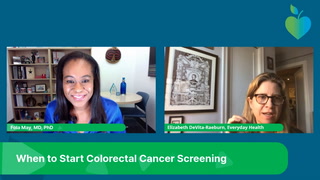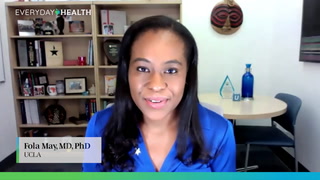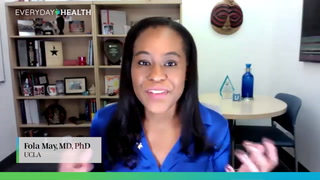What Is Colon and Rectal Cancer? Symptoms, Causes, Diagnosis, Treatment, and Prevention

Colon cancer, which affects the large intestine, is one of the most common cancers in the United States.
Medical experts typically group it with rectal cancer in a category called colorectal cancer.
Colorectal cancer is the fourth most common cancer among men and women in the United States, after lung, breast, and prostate cancer (and excluding skin cancers).
It is also the second leading cause of cancer death in the United States, behind lung cancer.
The colon and rectum are part of the digestive system. The colon is about five feet long and accounts for most of the large intestine. The rectum makes up the final six inches of the large intestine and is considered the passageway between the colon and the anus.
Colorectal cancer occurs when abnormal cells in the colon or rectum grow uncontrollably, crowding out healthy cells.
More than 96 percent of colon and rectal cancers are a type known as adenocarcinomas, according to the American Cancer Society (ACS). (1)
Adenocarcinomas are cancers that begin in glandular (secretory) cells, found in tissues that line certain internal organs. Glandular cells produce a mucus that lubricates the colon and rectum.
Colon and rectal cancers generally start as abnormal growths, called colorectal polyps, in the lining of the colon or rectum.
Many people with polyps do not go on to develop cancer. Individuals with a large polyp (bigger than 1 centimeter), multiple polyps or a polyp with dysplasia (abnormal but not yet cancerous cells) are most at risk.
When Should You Start Getting Screened For Colorectal Cancer?

How Common Is Colon Cancer?
Around 1 in 20 Americans will develop colon cancer or rectal cancer at some point in their lives, according to the most recent data (2013–2015) from the National Cancer Institute (NCI). (2)
This data also suggests that more than 1.3 million people are living with colorectal cancer.
Looking at projections for 2021, the American Cancer Society estimates that close to 105,000 new cases of colon cancer and more than 45,000 new cases of rectal cancer are diagnosed in the United States annually.
Colorectal cancer makes up about 8 percent of all new cancer cases in the country, according to the NCI.
The Importance of Colon Cancer Screenings
Getting regular screening tests is essential for preventing colorectal cancer.
These tests allow doctors to look for this cancer in the general population, assessing people who have no symptoms of the disease.
Screenings can help doctors detect and remove colorectal polyps before they become cancerous. It takes 10 to 15 years for new polyps to turn into cancer, according to the ACS.
Screenings can also detect colon cancer and rectal cancer early, when these diseases are most treatable.
If colorectal cancer is found at the local stage, before it spreads beyond the colon or rectum, the five-year survival rate is around 90 percent.
Unfortunately, only a little more than one-third of all colon cancers and rectal cancers are found this early, in large part because of inadequate screening.
The U.S. Preventive Services Task Force (USPSTF), which sets policy for Medicare and private insurers under the Affordable Care Act, used to recommend that colorectal screening for people at average risk begin at age 50.
But in May 2018, the American Cancer Society revised its guidelines and shifted their recommendation to 45, and the USPSTF followed suit. (3)
The change was prompted by an analysis of data revealing increasing incidence of colon cancer and rectal cancer among younger Americans.
New research puts at least some of the blame for this problem on rising obesity rates.
A study published in October 2018 in the journal JAMA Oncology tracked the health of over 85,000 women for 22 years and found that the higher a woman’s body mass index (BMI), the greater her risk of developing colorectal cancer before age 50. (4)
Common Questions & Answers
Causes and Risk Factors of Colon and Rectal Cancer
What causes colon cancer and rectal cancer? Researchers are still trying to answer that question fully. They do know that a small number of people develop colorectal cancer because of rare genetic mutations passed down through their families. Yet for the vast majority of patients, colorectal cancer reflects a complex interplay between genetics and lived experiences.
A very small number of colorectal cancers are likely caused by mutations inherited from parents. Most genetic mutations are acquired, meaning they occur during one’s life.
In some cases a mutation in the APC gene, which normally keeps cell growth in check, may play a part.
Doctors have identified a number of factors related to colon cancer risk and rectal cancer risk that increase a person’s odds of developing disease.
Weight, physical activity levels, and diet appear to have a stronger connection to these cancers than they do to any other type of cancer.
Risk factors that may be within a person’s power to modify include:
- Obesity or excess weight, especially around the midsection
- A physically inactive lifestyle
- A diet that includes lots of red meat (beef and lamb) and processed meat (certain luncheon meats and hot dogs)
- Smoking
- Heavy alcohol use
Risk factors that are not under a person’s control include:
- Age (Although individuals can develop colorectal cancer at any age, people older than 50 are at highest risk.)
- A personal or family history of colorectal cancer or polyps
- A personal history of inflammatory bowel disease, such as Crohn’s disease or ulcerative colitis
- Rare inherited genetic syndromes, such as Lynch syndrome
- African American or Eastern European Jewish heritage
- Type 2 diabetes
Prevention of Colon and Rectal Cancer
The best way to prevent colorectal cancer is to stop it before it starts. First off: Don’t smoke. Although people associate cigarettes with lung cancer, they are less aware of its strong connection to colorectal cancer.
Other ways to stave off colon cancer and rectal cancer include maintaining a healthy weight, exercising regularly, avoiding moderate to heavy alcohol use, and following a healthy diet that keeps red and processed meats to a minimum.
Following the recommended schedule for screening tests, such as colonoscopies, can also help doctors find and remove potentially precancerous growths called polyps. Removal of polyps detected through screening is one reason the death rate from colorectal cancer has been dropping over the past few decades.
Signs and Symptoms of Colon Cancer
Colorectal cancer can be challenging to detect early because it may not cause symptoms until it is more advanced. When symptoms do occur, they can be easy to blame on something else — hemorrhoids, for instance, or irritable bowel syndrome.
When in doubt, the smart decision is to speak with a doctor as soon as possible.
The most common symptoms include:
- A change in bowel habits, such as diarrhea, constipation, or narrowing of the stool, that lasts for more than a few days
- A feeling of needing to have a bowel movement that is not relieved by having one
- Rectal bleeding with bright red blood
- Blood in the stool, which can make feces look dark
- Cramping or abdominal pain
- Weakness or fatigue
- Unexplained weight loss
Colon and Rectal Cancer Stages: What They Can Tell You
Staging colorectal cancer — describing the extent of the disease — helps doctors make treatment decisions and predict outcomes. For colon cancer and rectal cancer, physicians review imaging scans such as CT (computerized tomography) scans and other tests to see whether the cancer is limited to the inner lining of the colon or rectum; whether it has grown into the colon or rectal wall; has spread to nearby lymph nodes; or has metastasized to further organs or sites in the body. Physicians quantify all this information to determine a stage from 0 to 4. Generally, the lower the stage, the less advanced the disease is, and the better the prognosis.
Conditions Related to Colon Cancer
Treatment and Medication Options for Colon and Rectal Cancer
If you have colon cancer or rectal cancer, you will likely have surgery, radiation therapy, or chemotherapy — or some combination of these treatments.
Surgery is often the first choice for many early-stage colon cancers and most rectal cancers. During a colonoscopy, for instance, doctors remove diseased tissue using instruments passed through a colonoscope (a long, narrow tube inserted into the body through the anus).
Radiation therapy employs X-rays or other types of radiation to destroy cancer cells.
Chemotherapy utilizes medicines that kill cancer cells and shrink tumors.
What’s more, researchers have been making important advances in the emerging field of targeted therapy — drugs that attack cancer cells with unique genetic or protein targets.
Scientists are also actively investigating immunotherapy, which uses the body’s own immune system to battle cancer. Clinical studies have shown that immunotherapy drugs called checkpoint inhibitors can help a small subset of colorectal cancer patients whose tumors have specific genetic changes.
Medication Used to Treat Colon Cancer
When Lynch Syndrome Runs in the Family
Sometimes an inherited gene mutation leads to an increased risk of colon cancer. When more than one close family member has been affected by colon cancer, a doctor may suggest that family members be tested for Lynch syndrome. A person with Lynch syndrome has up to an 80 percent lifetime risk of colon cancer and up to a 60 percent chance of endometrial cancer. It also increases the risk for gastric cancer, ovarian cancer, small bowel, brain, urinary tract, hepatobiliary tract (liver, bile ducts, and gallbladder), and sebaceous gland tumors.
Colon and Rectal Cancer Information, Resources, and Support
At some point in the process of — or after — a cancer diagnosis, you may find yourself in need of organizations that can step in and provide information, support, and help with unforeseen needs, like financial aid and words of wisdom from people who have been there. We’ve collected some of the most helpful resources for you, for when you need them most.

Sign up for our Cancer Care Newsletter!
By subscribing you agree to the Terms of Use and Privacy Policy.
Editorial Sources and Fact-Checking
References
- What Is Colorectal Cancer? American Cancer Society. February 21, 2018.
- Cancer Stat Facts: Colorectal Cancer. National Cancer Institute.
- Colorectal Cancer Screening for Average-Risk Adults: 2018 Guideline Update From the American Cancer Society. CA: A Cancer Journal for Clinicians. May 30, 2018.
- Liu PH, Wu K, Ng K, et al. Association of Obesity With Early-Onset Colorectal Cancer Among Women. JAMA Oncology. October 11, 2018.
The Latest in Colon Cancer
These 4 Symptoms Are Red Flags for Early-Onset Colorectal Cancer
Having one or more of these symptoms — diarrhea, stomach pain, bloody stools, and anemia — is associated with higher risks of developing colorectal cancer...
By Lisa Rapaport
7 Ways to Prevent Colon Cancer
Maintaining a healthy weight, exercising more, eating more produce, and avoiding alcohol and cigarettes are among the many ways you can help prevent colon...
By Pamela Kaufman
Colorectal Cancer: Who’s Really at Risk?
White men over 50 used to be the poster child for colorectal cancer. These days, the face of risk is changing.
By Elizabeth DeVita-Raeburn
How Will My Colon Cancer Be Treated?
Surgery, radiation, and chemotherapy are the cornerstones of treatment for colon and rectal cancer, but targeted therapies and immunotherapy are increasingly...
By Pamela Kaufman
How Black Americans With Metastatic Colorectal Cancer Can Get the Best Treatment
To get the support you need during colorectal cancer treatment, get support from organizations and resources that know what you’re going through.
By Bob Barnett
7 Ways Black Americans With Metastatic Colorectal Cancer Can Find Support
To get the support you need during colorectal cancer treatment, get support from organizations and resources that know what you’re going through.
By Bob Barnett
Metastatic Colorectal Cancer Couldn’t Keep Kecia Johnson Down
Johnson is a Black woman who has survived AIDS and stage IV metastatic rectal cancer. Find out how she now empowers others with colorectal cancer.
By Bob Barnett
What Are the Causes and Risk Factors of Colon Cancer?
Some colon cancers are caused by inherited genetic mutations, while others are likely a result of risk factors such as age and exposure to environmental...
By Pamela Kaufman
A Treatment Plot Twist: The Colorectal Cancer Clinical Trial That Changed Everything
A colorectal cancer treatment clinical trial of an immunotherapy drug gives patients new hope.
By Kelly Spill
Colorectal Cancer Screening: Which Method Is Right for You?
Colonoscopy is still considered the gold standard for colorectal cancer screening, but there are other tools that may be a better fit.
By Julie Lynn Marks






